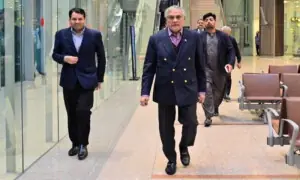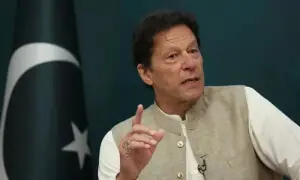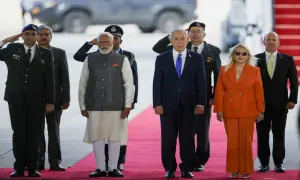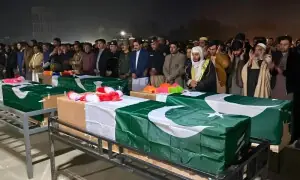SC removes ‘controversial paragraphs’ from Mubarak Sani case decision
6 min readThe Supreme Court has approved the joint appeal of federal and Punjab governments seeking omissions of controversial paragraphs 7 and 42 from the court’s July 24 revised verdict in the Mubarak Sani case after taking input from scholars.
In its ruling on Thursday, the court stated: “The removed paragraphs of the Mubarak Sani review decision cannot be presented as judicial precedent.”
The apex court deleted paragraphs 7, 42, and 49(c) from the review decision, following a request from scholars to eliminate such sections, which referred to the banned Ahmadiyya literature and preaching.
It merits here to mention that a two-member bench led by CJP Isa heard the case, which included an application for bail and the removal of certain charges against the accused. The application was filed after the Lahore High Court rejected the bail on November 16 and 27, 2023.
The FIR against the accused, registered on December 6, 2022, in Chiniot, listed three charges under the 2011 Punjab Printing of the Quran Act and Sections 298(c) and 295(b) of the Pakistan Penal Code.
The FIR alleged that the accused was distributing the banned book “Tafseer-e-Saghir.” But the defence lawyer argued that according to the FIR, the alleged crime occurred in 2019, while the distribution or publication of any banned literature was only criminalised under the Punjab Quran (Amendment) Act in 2021.
Justice Isa noted in the ruling that since distributing the banned book was not a crime in 2019, the charges could not be imposed on the petitioner.
Hearing
A three-member SC bench led by Chief Justice of Pakistan Qazi Faez Isa and including justices Irfan Saadat Khan and Naeem Akhtar Afghan heard the request from the Punjab government to eliminate certain paragraphs. Prominent religious figures, including Maulana Fazlur Rehman, were present in court during the proceedings.
The AGP informed the apex court that there were certain paragraphs in the decision that required the court’s attention, emphasising that it was a religious matter and inviting the court to hear from religious scholars if deemed appropriate.
CJP Isa inquired if Parliament had instructed AGP Awan to bring forth the request. The AGP responded that it was directed by the prime minister and that the National Assembly speaker had written a letter regarding it.
The CJP remarked that a person’s actions and words should be recognised together, affirming the importance of Parliament’s input, which he appreciated. He further acknowledged that if a mistake occurs, it should not become a matter of ego, expressing gratitude to those who filed the review petition and stressed the need for corrections if errors were identified.
When he inquired about the religious scholars present in the courtroom, JUI-F chief Maulana Fazlur Rehman stepped forward. The CJP expressed a desire to ascertain which leaders would provide guidance.
The court then decided to seek assistance from clerics present in the courtroom, including Fazl, Mufti Sher Muhammad, Sahibzada Abul Khair Muhammad Zubair of the Milli Yakjehti Council, and Jamaat-i-Islami’s Fareed Paracha.
While addressing Fazl, he requested clarification on any mistakes or objections in the court’s decision and assuring that the bench would also hear from other prominent figures.
Meanwhile, Mufti Taqi Usmani appeared before the court via video link from Turkiye.
Chief Justice Qazi Faez Isa noted that the court sought guidance from Mufti Taqi Usmani while a representative for Mufti Muneebur Rehman was also present.
Mufti Taqi Usmani argued for the removal of paragraphs 7 and 42 from the revised judgment issued on July 24, highlighting what he termed “errors” in those sections.
Paragraph 42 of the judgment stated: “Details of the Constitutional and legal provisions and judicial precedents have proved that after declaring both groups of Ahmadis as non-Muslims, according to the constitution and law, they have the right to practice their religion and express and preach it, provided that they will neither use religious terms for Muslims in public nor present themselves as Muslims in public.
“However, they have the right to ‘privacy of home’ in their houses, places of worship, and specific private institutions within ‘reasonable limits’ prescribed by law.”
He explained that the use of the term “tableegh” (preaching) in paragraph 42 implied an unrestricted endorsement of such activities.
In response, CJP Isa referenced Section 298 of the Pakistan Penal Code (PPC), which outlines penalties for actions intended to offend religious sentiments. Usmani countered that, according to this section, non-Muslims were prohibited from preaching while impersonating Muslims. He emphasised that the Ahmadiyya community, though a minority, does not categorize itself as non-Muslim, thus arguing for a revision of paragraph 42.
The chief justice acknowledged the court’s oversight, apologising for not thoroughly reviewing the extensive documents submitted by the parties involved. He encouraged Usmani to outline his objections clearly for the court’s consideration, assuring that any unclear points would be addressed.
Justice Isa remarked that as an Islamic republic, Pakistan’s court orders reference the Holy Quran and Hadith of the Prophet Muhammad (PBUH).
CJP Isa said, “I am not above any mistake,” emphasising the necessity for comprehensive rulings in complex cases. He stated that the court’s February 6 decision was no longer relevant and stressed the need to focus on future directions.
He pointed out the common practice of referencing legal systems in America and Britain, questioning why Pakistan should not establish its own precedents. Justice Isa made an analogy about matriculation exams, implying that without participation, there is no risk of failure.
Mufti Usmani, responding, remarked that the court should dedicate more time to the substantive issues at hand rather than focusing on procedural matters.
Faz noted that the court had already conducted numerous hearings and was now reassessing its decisions. However, Chief Justice Isa clarified that this was not merely a review. Fazl termed it a “third view” of the court’s decision and highlighted objections from various scholars and the Council of Islamic Ideology regarding the SC’s ruling.
The JUI-F chief expressed concern that while discussions painted Ahmadis as non-Muslims, their perspectives were largely overlooked. He said: “We do not want to create any issues for non-Muslims in Pakistan.”
During the proceedings, KP Chief Khatib Maulana Tayyab Qureshi expressed agreement with his fellow clerics and urged the court to address the concerns of the Muslim community, stating, “Muslims are hurt, please satisfy them.”
The KP’s chief khatib invited CJP Isa to visit the historic Mahabat Khan Mosque in Peshawar, prompting the judge to recall that it was located at Chowk Yadgar.
He reflected on a memorable speech given by his father during the Pakistan movement at that same location, noting that the crowd, initially opposed to the Muslim League, began chanting “Quaid-i-Azam” after his speech.
Also, read this
Religio-political parties protesters attempt to reach Supreme Court
Law minister vows to defend honour of Prophet Muhammad (PBUH)
Sahibzada Abul Khair Muhammad Zubair urged the court to remove paragraph 42 from the revised ruling. Senior lawyer Latif Khosa later requested that his name, along with that of Sahibzada Hamid Raza of the Sunni Ittehad Council, be added as respondents. “We are representing the parliamentary committee and the Parliament,” Khosa stated.
“Parliament can even strike down court orders. You may go to the Parliament to exercise your right,” CJP Isa said, alluding to recent amendments that allow legislative changes to take precedence over judicial rulings.
Following discussions, the court announced a break in the hearing. After resuming, it accepted the applications to remove specific sections from the ruling.
For the latest news, follow us on Twitter @Aaj_Urdu. We are also on Facebook, Instagram and YouTube.
























Comments are closed on this story.